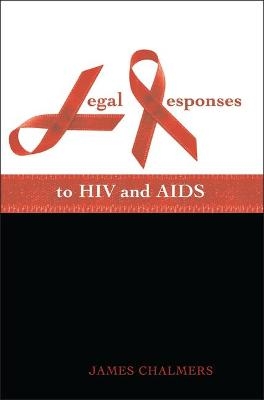
Legal Responses to HIV and AIDS
Hart Publishing (Verlag)
978-1-84113-726-1 (ISBN)
- Titel ist leider vergriffen;
keine Neuauflage - Artikel merken
Since the 1980s legislators and courts have responded in a variety of ways to the onset of the AIDS pandemic. Some responses have been sensitive to the needs of those with HIV, seeking to guarantee heightened levels of confidentiality or freedom from discrimination. Others have sought to use the law as a tool to limit the spread of HIV, for example by imposing liability for its transmission or restricting the freedoms of those who are HIV-positive. Elsewhere, doctors and researchers have grappled with the legal and ethical problems surrounding testing for a condition which many people may not want to be aware of, and with the conflicts which can arise between respect for individual autonomy and the promotion of public health. More recently, treatments for HIV have developed to the extent that for many HIV is a chronic disease rather than an inevitably fatal condition. Such treatments, however, pose new challenges: they are expensive and as such are not widely available in those parts of the globe where HIV infection is most widespread.
This has caused tensions over issues such as asylum, immigration and deportation, and the protection of intellectual property rights which may bar such treatments from being available where the need is most acute. This book examines and evaluate these issues in comparative perspective. It draws on legal responses to other sexually transmitted infections (and contagious diseases) but concentrates on HIV and AIDS.
James Chalmers is a senior lecturer in law at the University of Edinburgh. He is a graduate of the University of Aberdeen and Tulane University, in New Orleans.
1 Introduction and Overview I. Legal Rather Than Legislative Responses II. Law and the Public Health Rather than Public Health Law III. Recurring Themes A. Mainstreaming and Exceptionalism B. Path Dependence C. The Importance of Avoiding Discrimination D. The Immanence of Human Rights Standards IV. Exploring Legal Responses in a Variety of Contexts 2 Testing for HIV: Legal and Ethical Problems I. Consensual Testing for HIV: Is Specific Knowledge Required? A. The Legal Framework (i) The First Legal Restraint: Battery (ii) The Second Legal Restraint: Liability in Negligence (iii) The Third Legal Restraint: Data Protection Legislation (iv) The Fourth Legal Restraint: The Human Tissue Act 2004 B. Specific Consent and Opt-Out Testing C. A Practical Caveat II. Testing Without Consent: Unlinked Anonymous Testing III. Antenatal Testing A. Informed Consent in Antenatal Screening: A Loose and Elusive Concept B. Applying Informed Consent to Antenatal Testing Practice IV. Premarital Testing V. Compulsory Testing Following Alleged Criminal Activity A. The Scottish 'Mandatory Testing' Proposals B. Evaluating the Legality of Mandatory Testing C. The Response to the Proposals VI. Testing Existing Samples Without Consent Following Accidental Exposure A. The Legal Framework B. Testing Without Consent: An Ethical Analysis 3 Confidentiality and Duties to Warn I. Medical Confidentiality and Duties to Warn: Some Early Views A. Dr Pritchard, Dr Paterson and Dr Playfair B. Embryonic Legal Restraints on Breach of Confidence C. Legal Compulsion to Breach Confidence II. The Development of Remedies for Breach of Confidence III. Modern Practice: Can a Breach of Confidence be Justified? A. When Can a Breach of Confidence be Ethically Justified? B. When Can a Breach of Confidence be Legally Justified? IV. A Step Further: Can a Breach of Confidence be Legally Required? A. Liability in Negligence for the Onward Transmission of HIV (i) Negligent Advice to One's Own Patient (ii) Can There be Liability Beyond This? (iii) Analysis: Categorising the Scenarios (iv) The ECHR and Liability for Onward Transmission V. From Principle to Practice (Almost): Health Protection Agency v X VI. The National Health Service (Venereal Diseases) Regulations 1974 A. The History and Purpose of the Regulations B. Does the History and Purpose Matter? VII. Conclusion 4 Harm Minimisation and the Law I. Community Needle Exchange A. The Background to the Problem B. Moving Towards Needle Exchange C. The Lord Advocate's Guidelines D. The Efficacy of Needle Exchange II. Harm Reduction Measures In Prisons A. Can Harm Reduction Measures in Prison be Compelled by Law? (i) The Difficulty of Applying Tort Law Prospectively (ii) Could Prison Authorities Actually be Responsible in Tort? B. Harm Reduction: The English Litigation (i) Fielding (ii) Shelley C. An Alternative ECHR-based Approach? III. Conclusion 5 HIV and Deportation from the United Kingdom I. Resisting Deportation under Article 3 of the European Convention on Human Rights A. D v United Kingdom B. The Practical Impact of Davoren's Case C. N v Secretary of State for the Home Department D. Evaluating the Decision in N (i) Can this Test ever be Met? (ii) Principle or Pragmatism? (iii) Could the Appellate Committee have gone Further? II. An Alternative Approach: Asylum Claims Based on Fear of Persecution III. Access to HIV Treatment Following Refusal of a Claim for Asylum IV. Conclusion 6 The Criminalisation of HIV Transmission I. Criminal Liability for the Sexual Transmission of Disease: False Starts and an Entrenched Lacuna A. Disapplying General Criminal Offences: R v Clarence B. Rejecting Specific Criminal Legislation: The Contagious Diseases Acts C. The Legacy of the Contagious Diseases Acts: Entrenching a Lacuna II. Attacking the Lacuna: The Law Commission's Proposals III. Closing the Lacuna: Judicial Reform A. R v Ireland; R v Burstow B. R v Dica IV. The Scope of the Current Law A. Can Prosecutions be Brought in Respect of Other Sexually Transmitted Infections? B. Can Prosecutions only be Brought for the Transmission of Disease? C. Does the Mens Rea Requirement Necessitate a Positive HIV Test? (i) D's Awareness of the Risk of HIV Transmission (ii) The Application of the Decision in R v Mowatt D. What is Required for Consent to Operate as a Defence? E. What is the Effect of Refraining from 'High Risk' Activities? V. Evidential Issues VI. Countervailing Considerations: The Case Against Criminalisation A. Does Criminalisation Deter People from Seeking HIV Tests? (i) The Uptake of HIV Testing in Scotland after Kelly's Conviction (ii) Unlinked Anonymous Testing B. Might Criminalisation Encourage Unsafe Sexual Behaviour? C. Are Prosecutions Discriminatory? VII. Seeking the Middle Ground: Prosecutorial Guidelines VIII.Co
| Erscheint lt. Verlag | 31.10.2008 |
|---|---|
| Verlagsort | Oxford |
| Sprache | englisch |
| Maße | 156 x 234 mm |
| Themenwelt | Medizin / Pharmazie ► Gesundheitswesen |
| Recht / Steuern ► Arbeits- / Sozialrecht ► Sozialrecht | |
| Recht / Steuern ► EU / Internationales Recht | |
| Sozialwissenschaften ► Politik / Verwaltung | |
| Sozialwissenschaften ► Soziologie | |
| ISBN-10 | 1-84113-726-X / 184113726X |
| ISBN-13 | 978-1-84113-726-1 / 9781841137261 |
| Zustand | Neuware |
| Informationen gemäß Produktsicherheitsverordnung (GPSR) | |
| Haben Sie eine Frage zum Produkt? |
aus dem Bereich


